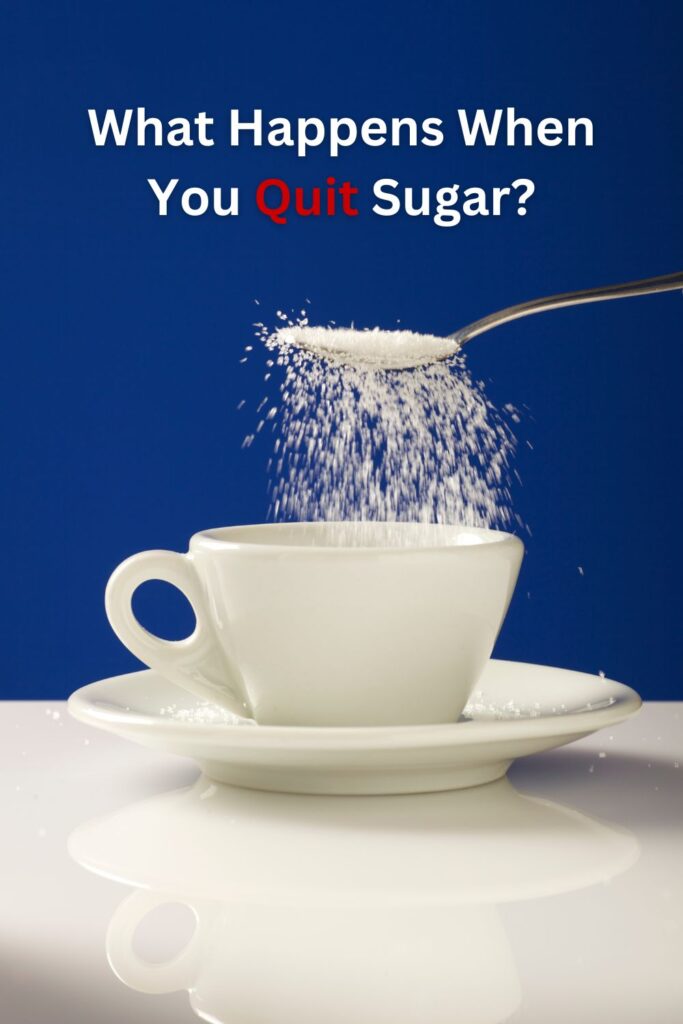The average American consumes half a cup or more of sugar every day. Some people claim that eating less sugar makes you crave it more and even gives them withdrawal symptoms. This article will explore what exactly happens to your brain and body when you try to quit sugar.

24 Hours: Losing Water Weight
In the first 24 hours of no sugar, blood sugar levels drop and the pancreas releases glucagon, which breaks down glycogen, the storage of sugars in our body, to create the energy you need. Glycogen is bound to 3 grams of water, so the breakdown of glycogen for energy is responsible for the initial loss of water weight you see in the first 24 hours of not eating sugar.
Day 2: Fatigue and Sugar Cravings
On day two, you might start to feel fatigued and crave sugar as your body continually needs to create new sources of energy. Gluconeogenesis is activated, which is the conversion of proteins to sugars in the body. Fats will be broken down into ketones to create energy. This can make you feel tired, get headaches, and even have sugar cravings.
Dopamine Release and Sugar Cravings
Animal studies have shown that in rats, neurochemical pathways causing dopamine release are activated when they consume sugar. In some cases, this can be more potent than cocaine in rats, leading to pop science article headlines like “sugar more addictive than cocaine.” Sugar activates dopamine release, creating a positive reinforcement around wanting to trigger cravings. However, there is no evidence that sugar can be as addictive as drugs like cocaine in humans.
Day 3: Metallic Taste and Bad Breath
On day three, you might experience a metallic taste in your mouth and your breath starting to stink. The breakdown of fat into ketones due to the lack of sugar intake creates the release of acetone in your body, which, when breathed out, smells like nail polish remover or rotting fruit. This smelly breath can last a few days to a few weeks.
Days 5-10: Increased Sensitivity to Sugar
Between days five and ten of not eating added sugar, your taste buds might become more sensitive to sugar. One study found that after a water fast for 5 to 14 days, the threshold to detect sweet flavor was much lower, increasing sensitivity to the taste of sugar. People who consume a lot of sugar decrease their sensitivity to sweet flavors, feeling like they need to add more sugar to their food or beverages to taste the sweetness.
Six Weeks: Improved Bowel Movements and IBS Relief
After six weeks of no sugar, you may notice your bowel movements becoming more regular with less bloating or cramps. Reducing refined sugars can relieve Irritable Bowel Syndrome (IBS) symptoms, which affects almost 10 to 20 percent of the population in North America. Doctors recommend a low FODMAP diet, which includes less refined sugar and more natural sugars.
10 Weeks: Healthier Skin
After 10 weeks of eating no sugar, you might start to notice that your skin is looking healthier. Sugar can cause acne lesions within one week of high intake, and clinical trials have shown that after 10 weeks of low sugar diets, acne lesions significantly reduce.
One Year: Improved Sleep
After one year with no additional sugar intake, you may see improved sleep. Studies have shown that three years of low sugar intake is correlated with reduced insomnia, although the effect of sugar on sleep is still controversial.
One to Five Years: Reduced Risk of Health Issues
After one to five years of no added sugar intake, your risk of high blood pressure, heart disease, type 2 diabetes, and obesity is reduced.
Reduced Risk of Cancer
High sugar intake is associated with a laundry list of other diseases, including cancers, mostly due to its association with obesity. By reducing your sugar intake over a period of one to five years, you may also decrease your risk of developing certain types of cancer.
Changing Beverage Consumption Habits
It’s estimated that almost 46 percent of added sugar in our diets comes from soda. In America, drinking soda has decreased over the past 10 years as people become more aware of the health risks associated with high sugar intake. This trend might continue as more individuals choose healthier alternatives to sugary drinks.
Artificial Sweeteners: A Viable Alternative?
Some people wonder if they can replace sugar with artificial sweeteners like aspartame without causing harm. While there is ongoing debate surrounding the safety and efficacy of artificial sweeteners, some studies suggest that they can be a suitable alternative to sugar for those looking to reduce their sugar intake. However, more research is needed to fully understand the long-term effects of artificial sweeteners on health.
Conclusion: The Benefits of Reducing Sugar Intake
In conclusion, reducing your sugar intake can have numerous positive effects on your health, ranging from weight loss and improved skin to better sleep and reduced risk of chronic diseases. While quitting sugar might come with some initial challenges, such as fatigue and sugar cravings, the long-term benefits make it a worthwhile endeavor for many individuals.
Remember to consult with a healthcare professional before making any drastic changes to your diet, as individual needs and circumstances may vary. It is crucial to maintain a balanced and nutritious diet to ensure overall health and well-being.







